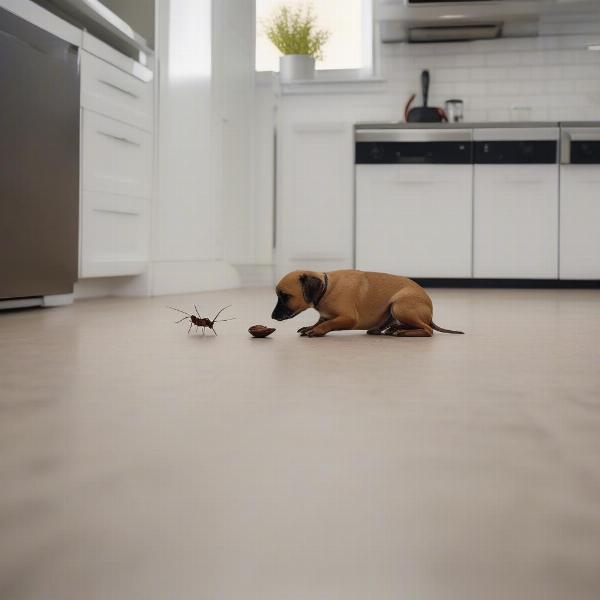Cockroaches are a common household pest, and it’s not unusual for a curious dog to sniff them out, or even try to eat them. But can dogs eat cockroaches? The short answer is: it’s generally not recommended. While a single cockroach likely won’t cause serious harm, consuming these insects carries potential risks that owners should be aware of. This article will delve into the potential dangers, signs of cockroach poisoning, and what to do if your dog eats a cockroach.
The Risks of Dogs Eating Cockroaches
While the crunchy exoskeleton might seem appealing to some dogs, cockroaches can harbor a variety of parasites and bacteria. These can lead to intestinal issues like vomiting and diarrhea in dogs.  Dog Eating a Cockroach Furthermore, cockroaches often live in unsanitary environments, exposing them to various toxins and pesticides. If a dog ingests a cockroach that has been exposed to these substances, it can lead to secondary poisoning. Another concern is the potential for allergic reactions. Some dogs are allergic to cockroaches, and ingestion can trigger symptoms ranging from mild skin irritation to severe anaphylactic shock.
Dog Eating a Cockroach Furthermore, cockroaches often live in unsanitary environments, exposing them to various toxins and pesticides. If a dog ingests a cockroach that has been exposed to these substances, it can lead to secondary poisoning. Another concern is the potential for allergic reactions. Some dogs are allergic to cockroaches, and ingestion can trigger symptoms ranging from mild skin irritation to severe anaphylactic shock.
Signs Your Dog Has Eaten a Cockroach and Potential Problems
How can you tell if your dog has snacked on a cockroach? You might witness the act directly, or you might notice subtle changes in your dog’s behavior. Some common signs include:
- Vomiting
- Diarrhea
- Loss of appetite
- Lethargy
- Excessive drooling
- Abdominal pain
If your dog exhibits any of these symptoms after potentially eating a cockroach, it’s important to contact your veterinarian immediately.
Parasites and Bacterial Infections
Cockroaches can carry intestinal parasites like roundworms and whipworms, which can be transmitted to dogs upon ingestion. These parasites can cause a range of health problems, including malnutrition, weight loss, and even intestinal blockage. Bacterial infections are also a concern, as cockroaches can transmit harmful bacteria like Salmonella and E. coli.
Pesticide Poisoning
If the cockroach has been exposed to pesticides, your dog can suffer from secondary poisoning. Symptoms of pesticide poisoning can vary depending on the type of pesticide ingested, but can include tremors, seizures, difficulty breathing, and even coma.
Allergic Reactions
Allergic reactions to cockroaches can manifest in different ways. Some dogs may experience mild skin irritation, while others may suffer from more severe reactions like facial swelling, difficulty breathing, and anaphylactic shock. A severe allergic reaction requires immediate veterinary attention.
What to Do if Your Dog Eats a Cockroach
If you suspect your dog has eaten a cockroach, the best course of action is to contact your veterinarian. They can provide specific advice based on your dog’s breed, size, and overall health. Provide them with as much information as possible, including the number of cockroaches potentially ingested and any observed symptoms. Your veterinarian may recommend bringing your dog in for an examination or monitoring them closely at home. In some cases, they may induce vomiting or administer activated charcoal to help absorb any toxins.
Preventing Cockroach Consumption
The best way to protect your dog from the risks associated with eating cockroaches is to prevent access to them in the first place. Here are some preventative measures:
- Keep your home clean and free of food debris.
- Store food in airtight containers.
- Regularly empty garbage cans.
- Seal any cracks or crevices where cockroaches may enter.
- Consider professional pest control services.
Conclusion
While a single cockroach ingestion might not be a cause for immediate panic, it’s crucial to be aware of the potential risks. Regular preventative measures, careful observation of your dog’s behavior, and prompt veterinary consultation are essential to ensuring your furry friend’s health and well-being. If your dog eats a cockroach, contact your vet immediately. Don’t wait for symptoms to appear, as early intervention can often prevent serious complications.
FAQ
- Is it common for dogs to eat cockroaches? Yes, dogs are naturally curious and may explore their environment by sniffing and tasting things, including cockroaches.
- What are the most serious risks of cockroach ingestion? Pesticide poisoning, parasite infestation, and allergic reactions are the most concerning potential complications.
- When should I contact my vet? Contact your veterinarian immediately if you suspect your dog has eaten a cockroach, even if they aren’t showing any symptoms.
- How can I prevent my dog from eating cockroaches? Maintaining a clean home, storing food properly, and sealing entry points are key preventative measures.
- Can cockroaches kill a dog? While rare, cockroach ingestion can lead to serious complications, especially if the cockroach has been exposed to toxins or if the dog has an allergic reaction.
- What are the signs of an allergic reaction to cockroaches in dogs? Skin irritation, facial swelling, difficulty breathing, and anaphylactic shock are potential signs of an allergic reaction.
- How are cockroaches treated in dogs? Treatment depends on the specific issue. Your vet may induce vomiting, administer activated charcoal, or prescribe medication for parasites or infections.
ILM Dog is your trusted resource for comprehensive dog care information. We cover a range of topics, from breed selection and health care to training, nutrition, grooming, and product recommendations. If you’re looking for expert advice on any aspect of dog ownership, our team of experts is here to help. Contact us today at [email protected] or +44 20-3965-8624. ILM Dog is dedicated to providing the best possible care for your canine companion.